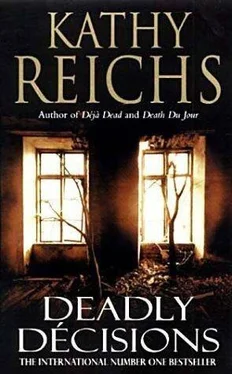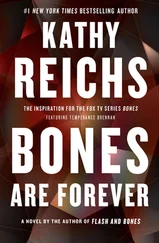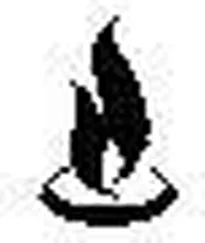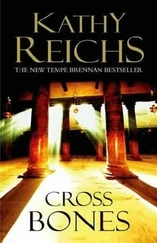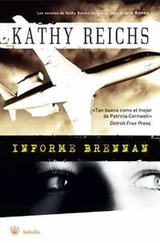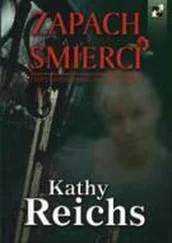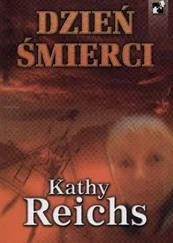"That saved the taxpayers some money.
"Yes, but remember there was a toll exacted on the public. A child got caught in the cross fire."
"That's right. She was nine years old." His eyes were focused on my face. "She died, didn't she?"
I nodded.
"Emily Anne Toussaint was killed the day you and Howard dropped off Bird."
"Holy crap."
"Since that time I have been pursuing forensic evidence pertaining to these biker crimes. So you can understand my lack of enthusiasm for your newly acquired friends."
"And tattoo. You've seen some rough shit."
"There s more.
I glanced at his face. Though shadowed by the eaves, his eyes were bright as a songbird's.
"This past week another biker was killed. Yves 'Cherokee' Desjardins."
"Which side?"
"He was a Predator That's the Angels."
"So the Heathens were still evening the score for the twins?"
"Maybe. The problem is Cherokee was an older guy who hadn't been active for a while. Also, it seems he was running his own coke concession.
"So he might have been snuffed by his own side?"
"It's possible. We don't have all the evidence. We just don't know. Right now our investigation has slowed."
I told him about LaManche.
"Holy shit. Maybe they got to him, too.
"Who?"
"The Angels. Maybe he was going to find something in that body they didn't want found."
"I don't think so, Kit."
"Maybe they slipped him something. You know, one of those poisons that leave no trace.
"He was in the awtopsy room. That's a secure area.
"There could be a mole at your lab. They do that, you know Position their people on the inside."
"Whoa." I laughed. "Let's not get carried away."
He turned and looked past the Japanese tourists to the misty peaks in the far distance. Someone opened a door behind us and pigeons startled from the steps.
'Jesus, Aunt Tempe, I feel like a real lowlife. Your boss is sick, and you're trying to juggle a zillion separate murders all at once. And what do I do? I show up, dump a dead fish on your counter, then run around town having fun."
The Japanese were moving our way.
"And I was too distracted to follow what you were doing. Anyway, ready to hike?"
"I live to ramble."
We circled the chalet and set off on one of the many dirt trails that honeycomb the mountain. We walked in silence for awhile, watching squirrels scuttle among last year's leaves, excited by the arrival of spring. The trees overhead were loud with chirps and trills and warbles and shrieks. At one point we stopped to listen to an old man perform a recorder adaptation of "Ode to Joy." Wearing a long overcoat and ear-flapped beret, he played with all the concentration of a symphonic virtuoso.
As we strolled west, the dome of l'Oratoire St-Joseph appeared on the horizon. I told Kit the story of Frère André's heart. Stolen from its altar crypt, the organ became the focus of a massive manhunt. Eventually it showed up at our lab, and was now ensconced in safer quarters deep within the church.
To the south rose the pale yellow tower of l'Ecole Polytechnique at l'Université de Montréal, site of the 1990 slaughter of thirteen women. The day was too lovely to share that story.
We were heading downhill when Kit broached an equally unpleasant topic.
"So who's this guy Ryan?"
"Just a friend," I hedged.
"Harry talked about him. He's a detective, right?"
"Yes. With the provincial police."
I'd introduced my sister to Ryan during her stay in Montreal. Sparks had flown, but I'd left town almost immediately and didn't learn if there was liftoff. I'd avoided Ryan for a long time after that, but I'd never asked.
"So what's the deal?"
"He's gotten into some trouble."
"What kind of trouble?"
A calèche passed on the road above, moving in the direction from which we'd come. I heard the driver cluck, then the slap of reins on the horse's neck.
"He may have gotten involved in drugs."
"Using?"
"Selling." Though I was trying hard, my voice sounded wavery.
"Oh."
The clop of hooves receded, grew quiet. "You care about this guy, don't you?" "Yes."
"More than Uncle Pete?" "That's not a fair question, Kit." "Sorry."
"Whatever happened to that fish?" I said, changing the subject.
"It's in the freezes"
"Here's a plan. We zap Mn Trout, then peruse les motards while he finishes defrosting. Tonight we throw him on the grill, then slide over to Hurley's for a few beers."
"It's a salmon. Otherwise the plan is sound."
We descended the rest of the way, cut through the Montreal General, and continued downhill on Côte-des-Neiges. At the bottom I turned and looked back up at the peak.
"Did you ever notice the cross at night?"
"Sure. It's pretty."
"From down here, yes. From nearby it's just a pile of steel mesh and bare bulbs. I think Andrew Ryan's like that. Nice at a distance, but up close he's a tangled mess."
The Beraqan are a horticultural people living in longhouse villages on the island of Borneo. When I taught introductory anthropology, I used them as an illustration of the absurdity of Western funerary practices.
According to Berawan beliefs, the souls of the dead are released to the afterlife only when the flesh has decomposed. Until that point, the deceased hover in limbo, no longer part of the living, but unable to join the dead. And there's a hitch. Their bodies can be reanimated by malevolent spirits roaming the world in search of housing. Once revived, these living-dead cannot be killed. Needless to say, the villagers are not wild about having them around.
The Berawan were repulsed and horrified when their ethnographer responded to questions about American customs. In their view, embalming, treatment with cosmetics and waxes, and burial in watertight coffins and vauits are actions of pure folly. Not only are we prolonging the transition of our loved ones, but our cemeteries provide vast storehouses for potential zombies.
I wondered how the Berawan would react to Bernard Silvestre, centerpiece of the photo in my hand. The fish was taking forever to defrost, and in the interim Kit and I were working our way through Kate's collection.
Silvestre lay in his coffin, mustache and sideburns spread symmetrically on each cheek, hands folded piously on his black leather jacket. Ten men crouched in a semicircle below, denimed and booted, while four stood flanking the open casket. Except for the dress and mangy appearance, they looked like a fraternity at a Paddy Murphy party
Elaborate bouquets stretched from one side of the photo to the other, a mini Rose Bowl of floral condolences. One said "Slick" in blue on yellow, another "Good-bye BS," in shades of red and pink. Carnations forming the number "13" rose directly behind the coffin, flaunting "Slick's" connection to pot or meth.
But best of show was the rectangle on the upper right, a petal mosaic of cycle and rider, complete with whiskers, shades, and angel's wings. I tried, but was unable to read the banners above the helmet and below the front tire.
"Know anything about Slick?" asked Kit.
"He doesn't look like the pick of the litter."
"Yeah, even from that motley litter." He flipped the picture. "Heck, this guy croaked when I was three years old."
There were two more photos of Slick's funeral, both taken from a distance, one at the cemetery the other on the church steps. Many of the mourners wore caps riding their eyebrows, and bandannas stretched to cover their mouths.
"The one you've got must be from a private collection." I handed Kit the other pictures. "I think these two are police surveillance photos. Seems the bereaved weren't anxious to show their faces."
"Man, this chopper is one statement in chrome and steel. No wonder the dude rode it right up to the grave.
Читать дальше
